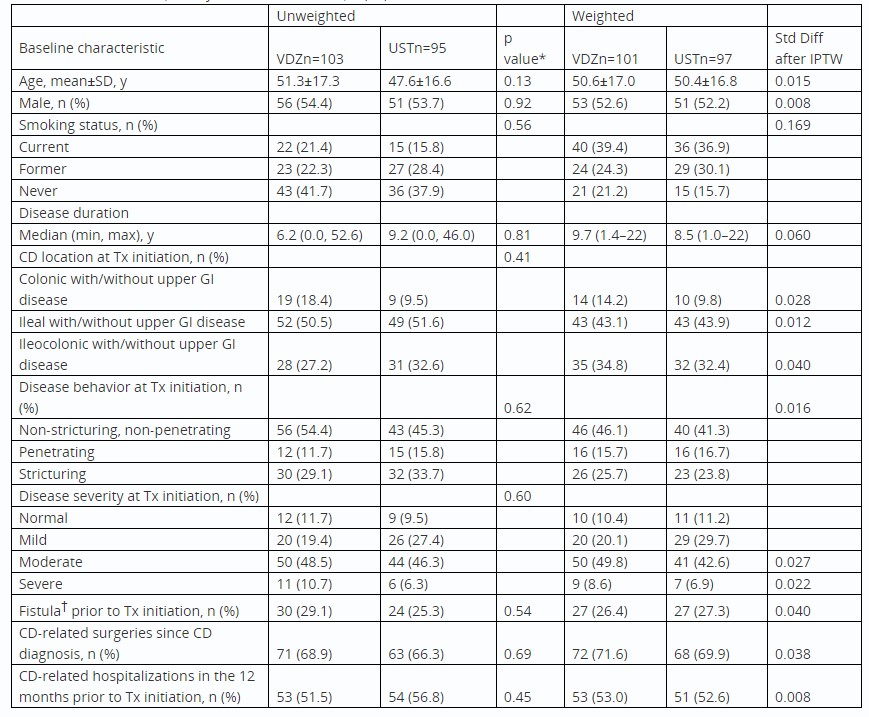Oral Paper Presentation
Annual Scientific Meeting
Session: Plenary Session 4B - IBD / Obesity / Stomach / Pediatrics
71 - Real-World Clinical Effectiveness and Safety of Vedolizumab and Ustekinumab in Bio-Naïve Patients With Complex Crohn’s Disease: Results from the EVOLVE Expansion Study
Wednesday, October 25, 2023
9:30 AM - 9:40 AM PT
Location: Ballroom B

Marc Ferrante, MD
University Hospitals Leuven
Leuven, Vlaams-Brabant, Belgium
Presenting Author(s)
Marc Ferrante, MD1, Britt Christensen, MD2, Brian Bressler, MD, MS, FRCPC3, Zaeem Khan, MPH4, Marielle Bassel, 4, Pravin Kamble, PhD5, Shashi Adsul, MD, MBA5, Zeinab Farhat, PhD5, Michael Scharl, MD6
1University Hospitals Leuven, Leuven, Vlaams-Brabant, Belgium; 2University of Melbourne and Royal Melbourne Hospital, Melbourne, Victoria, Australia; 3St. Paul’s Hospital, Vancouver, BC, Canada; 4PPD, part of Thermo Fisher Scientific, Montreal, PQ, Canada; 5Takeda Pharmaceuticals, Cambridge, MA; 6University of Zurich, Zurich, Zurich, Switzerland
Introduction: Effectiveness of Crohn’s disease (CD) treatment (Tx) may vary per CD complexity. This analysis compared real-world clinical effectiveness and safety of vedolizumab (VDZ) and ustekinumab (UST) in bio-naïve patients (pts) with complex CD.
Methods: Multicenter, observational, retrospective EVOLVE Expansion chart review study (NCT05056441) included bio-naïve pts with CD (≥ 18 years old) who initiated VDZ or UST in Australia, Belgium, or Switzerland from 2016 to 2021. A subgroup analysis analyzed outcomes in pts with complex CD (defined as at least 1 of: active fistula at Tx initiation and/or any prior CD-related surgeries during disease duration and/or CD-related hospitalizations in 12 months before Tx initiation). Data were collected from Tx initiation to the first of: chart abstraction initiation, Tx discontinuation, death, or loss to follow-up. Cumulative rates of clinical response, clinical remission, mucosal healing (all assessed using published algorithms1) and Tx persistence over 36 months of Tx were estimated in time-to-event analysis using Kaplan-Meier method. Safety was evaluated as serious adverse events (SAEs) and serious infections (SIs); healthcare resource utilization (HCRU) was evaluated as CD exacerbations, CD-related hospitalizations, and CD-related surgeries. Inverse probability of treatment weighting (IPTW) was used to balance baseline characteristics between cohorts. p< 0.05 denoted statistical significance.
Results: In total, 198 pts (VDZ 103, UST 95) with complex CD were included in this analysis. Baseline characteristics between groups were similar after IPTW (Table 1). During 36 months of Tx, pts from VDZ and UST cohorts had similar rates of clinical response (VDZ 76.4%, UST 80.2%; p=0.47), clinical remission (VDZ 79.9%, UST 83.1%; p=0.40), mucosal healing (VDZ 92.6%, UST 78.7%; p=0.05), and Tx persistence (VDZ 73.1%, UST 70.0%; p=0.81). There were no significant differences in the risk of SAEs (HR=0.84; 95% CI, 0.38-1.85; p=0.66), CD exacerbations (HR=0.89; 95% CI, 0.49-1.65; p=0.72), CD-related surgeries (HR=3.39; 95% CI, 0.97-11.84; p=0.06), and CD-related hospitalizations (HR=0.81; 95% CI, 0.42-1.57; p=0.53) during 36 months.
Discussion: In a real-world clinical setting, pts with complex CD had similar cumulative rates of clinical response, clinical remission, mucosal healing, and Tx persistence as well as similar risk of SAEs and HCRU outcomes between VDZ and UST cohorts during 36 months.
Reference: 1. Bressler B, et al. J Crohns Colitis. 2021;15(10):1694-1706.

Disclosures:
Marc Ferrante, MD1, Britt Christensen, MD2, Brian Bressler, MD, MS, FRCPC3, Zaeem Khan, MPH4, Marielle Bassel, 4, Pravin Kamble, PhD5, Shashi Adsul, MD, MBA5, Zeinab Farhat, PhD5, Michael Scharl, MD6, 71, Real-World Clinical Effectiveness and Safety of Vedolizumab and Ustekinumab in Bio-Naïve Patients With Complex Crohn’s Disease: Results from the EVOLVE Expansion Study, ACG 2023 Annual Scientific Meeting Abstracts. Vancouver, BC, Canada: American College of Gastroenterology.
1University Hospitals Leuven, Leuven, Vlaams-Brabant, Belgium; 2University of Melbourne and Royal Melbourne Hospital, Melbourne, Victoria, Australia; 3St. Paul’s Hospital, Vancouver, BC, Canada; 4PPD, part of Thermo Fisher Scientific, Montreal, PQ, Canada; 5Takeda Pharmaceuticals, Cambridge, MA; 6University of Zurich, Zurich, Zurich, Switzerland
Introduction: Effectiveness of Crohn’s disease (CD) treatment (Tx) may vary per CD complexity. This analysis compared real-world clinical effectiveness and safety of vedolizumab (VDZ) and ustekinumab (UST) in bio-naïve patients (pts) with complex CD.
Methods: Multicenter, observational, retrospective EVOLVE Expansion chart review study (NCT05056441) included bio-naïve pts with CD (≥ 18 years old) who initiated VDZ or UST in Australia, Belgium, or Switzerland from 2016 to 2021. A subgroup analysis analyzed outcomes in pts with complex CD (defined as at least 1 of: active fistula at Tx initiation and/or any prior CD-related surgeries during disease duration and/or CD-related hospitalizations in 12 months before Tx initiation). Data were collected from Tx initiation to the first of: chart abstraction initiation, Tx discontinuation, death, or loss to follow-up. Cumulative rates of clinical response, clinical remission, mucosal healing (all assessed using published algorithms1) and Tx persistence over 36 months of Tx were estimated in time-to-event analysis using Kaplan-Meier method. Safety was evaluated as serious adverse events (SAEs) and serious infections (SIs); healthcare resource utilization (HCRU) was evaluated as CD exacerbations, CD-related hospitalizations, and CD-related surgeries. Inverse probability of treatment weighting (IPTW) was used to balance baseline characteristics between cohorts. p< 0.05 denoted statistical significance.
Results: In total, 198 pts (VDZ 103, UST 95) with complex CD were included in this analysis. Baseline characteristics between groups were similar after IPTW (Table 1). During 36 months of Tx, pts from VDZ and UST cohorts had similar rates of clinical response (VDZ 76.4%, UST 80.2%; p=0.47), clinical remission (VDZ 79.9%, UST 83.1%; p=0.40), mucosal healing (VDZ 92.6%, UST 78.7%; p=0.05), and Tx persistence (VDZ 73.1%, UST 70.0%; p=0.81). There were no significant differences in the risk of SAEs (HR=0.84; 95% CI, 0.38-1.85; p=0.66), CD exacerbations (HR=0.89; 95% CI, 0.49-1.65; p=0.72), CD-related surgeries (HR=3.39; 95% CI, 0.97-11.84; p=0.06), and CD-related hospitalizations (HR=0.81; 95% CI, 0.42-1.57; p=0.53) during 36 months.
Discussion: In a real-world clinical setting, pts with complex CD had similar cumulative rates of clinical response, clinical remission, mucosal healing, and Tx persistence as well as similar risk of SAEs and HCRU outcomes between VDZ and UST cohorts during 36 months.
Reference: 1. Bressler B, et al. J Crohns Colitis. 2021;15(10):1694-1706.

Table: Table 1. Baseline characteristics of bio-naïve patients with complex CD initiating first-line biologic treatment with vedolizumab or ustekinumab.
*Unadjusted p values are reported. †Enterocutaneous, perianal, rectovaginal, other, or unknown.
CD, Crohn’s disease; GI, gastrointestinal; IPTW, inverse probability of treatment weighting; Std Diff, standardized difference; Tx, treatment; UST, ustekinumab; VDZ, vedolizumab; y, years.
*Unadjusted p values are reported. †Enterocutaneous, perianal, rectovaginal, other, or unknown.
CD, Crohn’s disease; GI, gastrointestinal; IPTW, inverse probability of treatment weighting; Std Diff, standardized difference; Tx, treatment; UST, ustekinumab; VDZ, vedolizumab; y, years.
Disclosures:
Marc Ferrante: AbbVie – Consultant, Grant/Research Support, Speakers Bureau. AgomAb Therapeutics – Consultant. Amgen – Grant/Research Support, Speakers Bureau. Biogen – Grant/Research Support, Speakers Bureau. Boehringer Ingelheim – Consultant, Speakers Bureau. Celgene – Consultant. Celltrion – Consultant. EG – Grant/Research Support. Eli Lily – Consultant. Falk – Speakers Bureau. Ferring – Speakers Bureau. Janssen – Grant/Research Support. Janssen-Cilag – Consultant, Speakers Bureau. Lamepro – Speakers Bureau. Medtronic – Consultant. MSD – Consultant, Speakers Bureau. Pfizer – Consultant, Grant/Research Support, Speakers Bureau. Regeneron – Consultant. Samsung Bioepis – Consultant. Sandoz – Consultant, Speakers Bureau. Takeda – Consultant, Grant/Research Support, Speakers Bureau. Thermo Fisher – Consultant. Truvion Healthcare – Speakers Bureau. Viatris – Grant/Research Support, Speakers Bureau.
Britt Christensen: AbbVie – Advisory Committee/Board Member, Grant/Research Support, Speakers Bureau. BMS – Advisory Committee/Board Member, Speakers Bureau. Celltrion – Advisory Committee/Board Member, Grant/Research Support, Speakers Bureau. Falk – Advisory Committee/Board Member, Speakers Bureau. Ferring – Advisory Committee/Board Member, Speakers Bureau. Fresenius Kabi – Advisory Committee/Board Member, Speakers Bureau. Gilead – Advisory Committee/Board Member, Speakers Bureau. Janssen – Grant/Research Support. Janssen-Cilag – Advisory Committee/Board Member, Speakers Bureau. MSD – Advisory Committee/Board Member, Speakers Bureau. Pfizer – Advisory Committee/Board Member, Grant/Research Support, Speakers Bureau. Sandoz – Advisory Committee/Board Member, Speakers Bureau. Takeda – Advisory Committee/Board Member, Grant/Research Support, Speakers Bureau.
Brian Bressler: AbbVie – Advisory Committee/Board Member, Grant/Research Support, Speakers Bureau. Alimentiv – Advisory Committee/Board Member. Allergan – Advisory Committee/Board Member. Alvine – Grant/Research Support. Amgen – Advisory Committee/Board Member, Grant/Research Support. AMT – Advisory Committee/Board Member. Bausch Health – Advisory Committee/Board Member. Boehringer Ingelheim – Grant/Research Support. Bristol Myers Squibb – Advisory Committee/Board Member, Grant/Research Support, Speakers Bureau. Celgene – Advisory Committee/Board Member, Grant/Research Support. Ferring – Advisory Committee/Board Member, Speakers Bureau. Fresenius Kabi – Advisory Committee/Board Member. Genentech – Advisory Committee/Board Member, Grant/Research Support. Gilead – Advisory Committee/Board Member. GlaxoSmithKline – Grant/Research Support. Iterative Scopes – Advisory Committee/Board Member. Janssen – Advisory Committee/Board Member, Grant/Research Support, Speakers Bureau. Merck – Advisory Committee/Board Member, Grant/Research Support, Speakers Bureau. Microbiome Insights – Advisory Committee/Board Member. Mylan – Advisory Committee/Board Member. Novartis – Advisory Committee/Board Member, Speakers Bureau. Pendopharm – Advisory Committee/Board Member. Pfizer – Advisory Committee/Board Member, Speakers Bureau. Protagonist – Advisory Committee/Board Member. Qu Biologic – Grant/Research Support, Stock Options. Takeda – Advisory Committee/Board Member, Speakers Bureau.
Zaeem Khan: PPD, part of Thermo Fisher Scientific – Employee.
Marielle Bassel: PPD, part of Thermo Fisher Scientific – Employee.
Pravin Kamble: Takeda – Employee, Stock Options.
Shashi Adsul: Takeda – Employee, Stock Options.
Zeinab Farhat: Takeda – Employee, Stock Options.
Michael Scharl: AbbVie – Grant/Research Support. Axalbion – Grant/Research Support. Basilea Pharmaceuticals – Grant/Research Support. Calypso Biotech – Grant/Research Support. Celltrion – Consultant. Falk Pharma – Speakers Bureau. Fresenius – Consultant. Gilead – Consultant, Grant/Research Support. Herbodee – Grant/Research Support. NodThera – Grant/Research Support. PharmaBiome – Grant/Research Support, Stock Options. Recolony – Stock Options. Roche – Grant/Research Support. Takeda – Consultant, Grant/Research Support. Topadur – Consultant. Vifor – Grant/Research Support, Speakers Bureau. Zealand Pharma – Grant/Research Support.
Marc Ferrante, MD1, Britt Christensen, MD2, Brian Bressler, MD, MS, FRCPC3, Zaeem Khan, MPH4, Marielle Bassel, 4, Pravin Kamble, PhD5, Shashi Adsul, MD, MBA5, Zeinab Farhat, PhD5, Michael Scharl, MD6, 71, Real-World Clinical Effectiveness and Safety of Vedolizumab and Ustekinumab in Bio-Naïve Patients With Complex Crohn’s Disease: Results from the EVOLVE Expansion Study, ACG 2023 Annual Scientific Meeting Abstracts. Vancouver, BC, Canada: American College of Gastroenterology.

